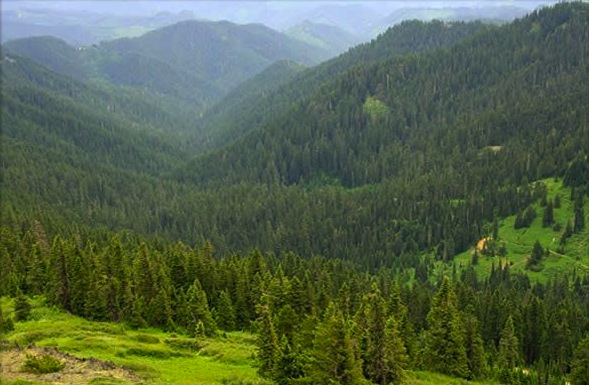An Oregonian op-ed touts the benefits of climate change policy for environment and economy alike, with emphasis on Oregon's rural communities:
Oregon's more than 149,000 woodland owners and other rural landowners can play a key role in slowing climate change by absorbing carbon dioxide in forests, farms and grasslands. In fact, the U.S. Environmental Protection Agency estimates that America's rural lands can absorb up to 25 percent of our nation's annual greenhouse gas emissions.
Oregon Sens. Ron Wyden and Jeff Merkley, along with several of their colleagues, have developed a program to reward landowners for capturing and storing carbon on their lands. The program, contained in the Forest Carbon Incentives Program Acts would pay owners for practices that will increase carbon uptake beyond usual levels, like reforesting damaged areas, improving forest management, or preventing development with a permanent conservation easement.
This program is an important complement to strong forest carbon offset markets, helping small owners who may not be able to participate in these markets because of high entry costs. Carbon offset markets and incentives such as these are essential components of climate legislation, to fully tap our forests to mitigate climate change. Recently a new Oregon-based company, Woodlands Carbon, was launched to assist family woodland owners who want to sell carbon offsets.
Rural America should not be overlooked in efforts to address climate change. Management of our rural landscape, especially our carbon-rich woodlands, is an essential piece. Ron Wyden and Jeff Merkley should be applauded for their efforts to create this win-win climate solution that will have far-reaching benefits for our economy and our environment.
I remain skeptical of the effectiveness of forest carbon offsets in temperate climates, since researchers have emphasized that we get the best bang for our carbon reduction buck by protecting tropical and, more recently, boreal forests.
But I like the direction that this merging of climate and conservation policy is heading, in terms of creating new income opportunities for landowners that are rooted in conservation, freeing them from economic dependence on logging and other extractive activities.
I can't wait to watch as additional opportunities crop up via the water ecosystem markets that are just now beginning to crop up...
Read more>>
...

No comments:
Post a Comment